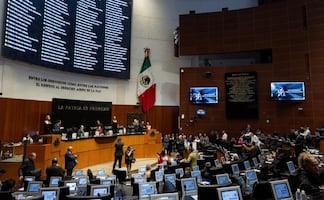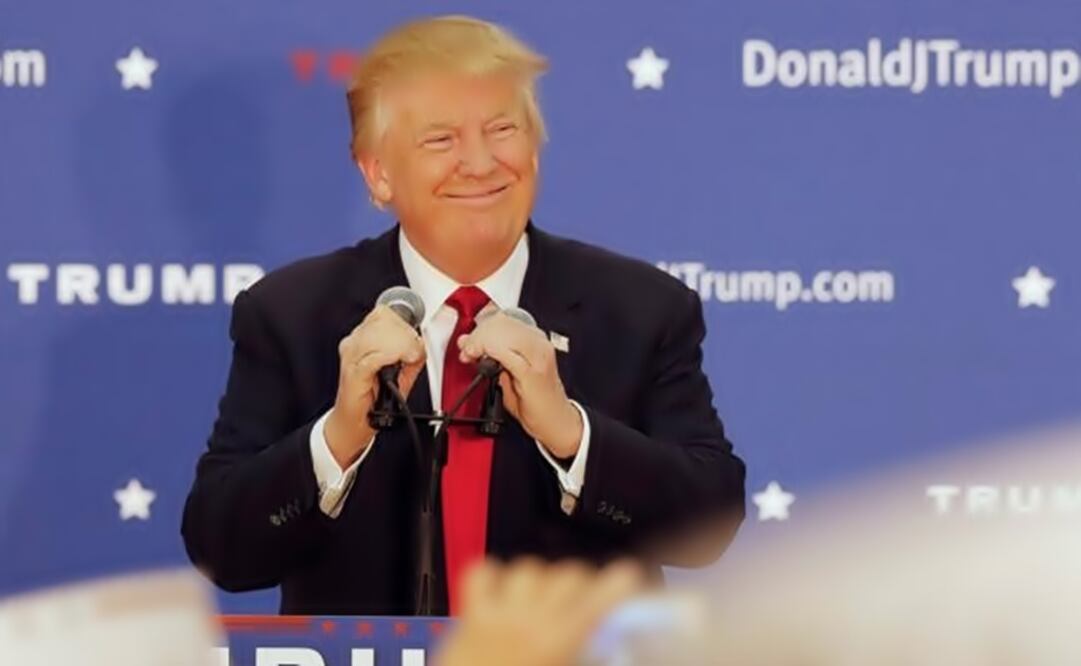Más Información

Monreal señala que errores de Morena afectan directamente a Sheinbaum; advierte fuertes disputas internas

Continúa baja de Vicealmirante Roberto de la Marina tras acusación de liderar red de huachicol; juez niega amparo

Noroña se lanza contra Díaz Ayuso tras dichos sobre México; quisieran en Madrid tener a Sheinbaum como gobernante, responde

Semar realiza operativo coordinado con la Guardia Costera de EU; aseguran 188 bultos con toneladas de cocaína

Avala Senado en fast track ingreso de 19 marines armados de EU a México; arribarán al país el próximo 15 de febrero

Harfuch reporta ataque armado a elementos de Semar en El Limoncito, Culiacán; caen 9 presuntos delincuentes y muere un agresor
Donald Trump doesn't have many fans in Britain's Parliament.
But a debate among lawmakers on calls to ban Trump from the country revealed little appetite to close Britain's doors to the provocative Republican U.S. presidential contender.
During a three-hour debate Monday, legislators from Britain's main parties stood to call Trump an attention-seeker, a demagogue and a fool. Many, though, argued that he should not be stifled or banned.
"While I think this man is crazy, while I think this man has no valid points to make, I will not be the one to silence his voice," said Conservative lawmaker Tom Tugendhat.
Parliament took up the topic after half a million people signed a petition calling for Trump to be excluded over his call for a temporary ban on Muslims entering the United States in the wake of extremist violence. Trump has also claimed that some areas of Britain are so radicalized that police fear for their lives.
Under British law, any petition supported by 100,000 people - who must each provide and confirm an email address - is considered for parliamentary debate. Monday's debate was intended to air the subject rather than take a vote.
Labour Party legislator Paul Flynn, who opened the session, said Trump had already received "far too much attention."
"The great danger by attacking this one man is that we can fix on him a halo of victimhood" and boost his popularity among supporters, Flynn said.
But another Labour lawmaker, Tulip Siddiq, supported a ban.
"This is a man who is extremely high-profile, ... a man who is interviewing for the most important job in the world," she said. "His words are not comical, his words are not funny. His words are poisonous."
Prime Minister David Cameron has condemned Trump's remarks about Muslims as "divisive, stupid and wrong," but he and other senior officials have said they do not think Trump should be banned.
The government has the power to deny entry to people with criminal convictions or those whose presence is considered not "conducive to the public good." The power has been used against figures as diverse as boxer Mike Tyson, rapper Tyler the Creator, radical Muslim preachers and the late Christian fundamentalist Fred Phelps Sr.
Britain also turned away anti-Islam Dutch legislator Geert Wilders at an airport in 2009. Wilders later sued and won the right to come to Britain.
Several lawmakers argued that banning Trump would betray the principles of free speech.
Conservative Paul Scully said that while people had been excluded from Britain for incitement or hatred, "I have never heard of one for stupidity and I'm not sure we should be starting now."
But Labour's Jack Dromey said Trump was dangerous because he stirred up hatred among different faiths.
"Donald Trump is a fool," Dromey said. "He is free to be a fool. He is not free to be a dangerous fool on our shores."
Trump's mother was born in Scotland, and he owns a golf resort there.
Sarah Malone, executive vice president of Trump International Golf Links, Scotland, said "debating a matter raised as part of the American Presidential election" was a waste of parliamentary time.
"Westminster is creating a dangerous precedent on this issue and is sending a terrible message to the world," she said.
Should Trump visit Britain again, he will have no shortage of things to do.
Labour legislator Naz Shah was one of several lawmakers who invited Trump to visit their constituencies to see Britain's multiethnic society first-hand. Shah said she would take him to a curry restaurant in her home city of Bradford.
She said was "a proud Muslim woman" and the Quran had taught her that "goodness is better than evil. If someone does bad, you do good in return."
Noticias según tus intereses
[Publicidad]
[Publicidad]








